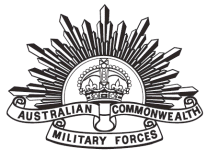
| Regimental number | 4303 |
| Place of birth | Batemans Bay New South Wales |
| Religion | Roman Catholic |
| Occupation | Telegraph operator |
| Address | Clifton, South Coast, New South Wales |
| Marital status | Single |
| Age at embarkation | 21 |
| Height | 5' 6" |
| Weight | 122 lbs |
| Next of kin | Father, T Smith, Clifton South Coast, New South Wales |
| Previous military service | Nil (exempt owing to profession - relieving telegraph operator on railway) |
| Enlistment date | |
| Rank on enlistment | Private |
| Unit name | 3rd Battalion, 13th Reinforcement |
| AWM Embarkation Roll number | 23/20/3 |
| Embarkation details | Unit embarked from Sydney, New South Wales, on board HMAT A60 Aeneas on |
| Rank from Nominal Roll | Private |
| Unit from Nominal Roll | 2nd Battalion |
| Fate | Returned to Australia |
| Discharge date | |
| Other details |
War service: Egypt, Western Front Taken on strength, 2nd Bn, Tel el Kebir, 14 February 1916. Proceeded from Alexandria to join the British Expeditionary Force, 22 March 1916; disembarked Marseilles, 28 March 1916. Found guilty, 3 July 1916, of (1) disobedience to orders, (2) overstaying leave, 1200-1700, 1 July 1916: awarded 14 days confined to barracks. Wounded in action, Pozieres, France, 22 July 1916 (gun shot wound, leg, and shock); admitted to No. 3 General Hospital, Treport, 27 July 1916; transferred to England, 28 July 1916, and admitted to 1st Southern General Hospital, King's Heath Section, Birmingham, 29 July 1916 (wound: slight); to 3rd Auxiliary Hospital, Dartford (date not recorded); discharged on furlough, 8 November 1916, to report to No. 1 Command Depot, Perham Downs, 20 November 1916. Found guilty, Dartford, 7 November 1916, of being absent without leave, 8.45-11.30 pm: awarded reduction of furlough of 96 hours. Marched out to No. 4 Command Depot, Wareham, 24 November 1916. Found guilty, Perham Downs, of being absent without leave, 3.30 pm, 20 November, to 10 pm, 21 November 1916: awarded 7 days confined to camp; forfeited 2 days pay. Proceeded overseas to France, 15 March 1917; rejoined Bn, 11 April 1917. Admitted to 1st Australian Field Ambulance, 3 August 1917 (pyrexia, unknown origin), and transferred to New Zealand Stationary Hospital; to No. 10 General Hospital, Rouen, 5 August 1917; to England, 13 August 1917, and admitted to 2nd Southern General Hospital, Bristol, 14 August 1917 (trench feet); to 3rd Auxiliary Hospital, 18 September 1917;to No. 2 Command Depot, Weymouth, 24 September 1917;to No. 4 Command Depot, Hurdcott, 26 November 1917. Admitted to Group Clearing Hospital, 7 March 1918 (influenza); discharged to No. 4 Command Depot, 14 March 1918. Found guilty, 5 March 1918, of being absent without leave, 9 pm, 5 March, to 4.20 pm, 6 March 1918: awarded 3 days confined to barracks; forfeited 2 days pay. Marched out to Overseas Training Brigade, 13 April 1918. Found guilty of being absent without leave from Tattoo, 2 August, until surrendering to Military Police, 6 pm, 12 August 1918: awarded 168 hours detention; forfeited 17 days pay. Found guilty, Sutton Veny, of failing to obey a lawful command given to him by his Superior Officer in that he failed to give his name when ordered to by Sergeant Clarke: awarded 168 hours detention. Admitted to 1st Australian Dermatological Hospital, Bulford, 27 August 1918 (urethritis); discharged, 3 September 1918. Admitted to 1st ADH, 2 November 1918; discharged, 25 January 1919; total period of treatment for venereal disease: 85 days. Found guilty of being absent without leave from 2150, 4 October, to 1930, 29 October 1918; period under charge: 30 October 1918 to 27 January 1919: awarded forfeiture of 129 days pay. Admitted to 1st ADH, 1 February 1919; discharged, 15 February 1919: total period of treatment for venereal disease: 15 days. Commenced return to Australia from Devonport on board 'Armagh', 5 April 1919; disembarked Sydney, 20 May 1919; discharged, 4 July 1919. Medals: British War Medal, Victory Medal |